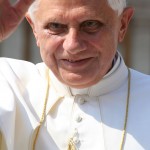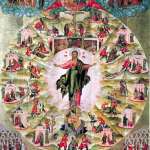A contemplation for today, from Hans Urs von Balthasar:
After a mother has smiled at her child for many days and weeks, she finally receives her child’s smile in response.
She has awakened love in the heart of her child, and as the child awakens to love, it also awakens to knowledge: the initially empty-sense impressions gather meaningfully around the core of the Thou.
Knowledge (with its whole complex of intuition and concept) comes into play, because the play of love has already begun beforehand, initiated by the mother, the transcendent . . .
The first thing that must strike a non-Christian about a Christian’s faith is that it is all too daring.
It is too beautiful to be true.
The mystery of being, unveiled as absolute love, coming down to wash the feet and the souls of its creatures; a love that assumes the whole burden of our guilt and hate, that accepts the accusations that shower down, the disbelief that veils God again when he has revealed himself, all the scorn and contempt that nails down his incomprehensible movement of self-abasement—all this, absolute love accepts in order to excuse his creature before himself and before the world . . .
God . . . “I am who I am” . . . also means:
My being is such that I shall always be present in every moment of becoming . . .
There will never be beings unloved by God, since God is absolute love . . .
Faith means the fundamental response to the love that has offered itself up for me.
It thus becomes clear that faith is ordered primarily to the inconceivability of God’s love, which surpasses us and anticipates us.
Love alone is credible; nothing else can be believed, and nothing else ought to be believed.
From Love Alone (1968), Unless You Become Like This Child (1991), and Dare We Hope? (1988), with all due credit, and my many thanks, to UCAN Spirituiality for today’s inspiration, as well as all of the quotations and their specific placement herein derived from these von Balthasar references. Any errors in transcription remain solely mine.
Peace
Image Credit: Wikimedia Commons, Robert Whitehead

















